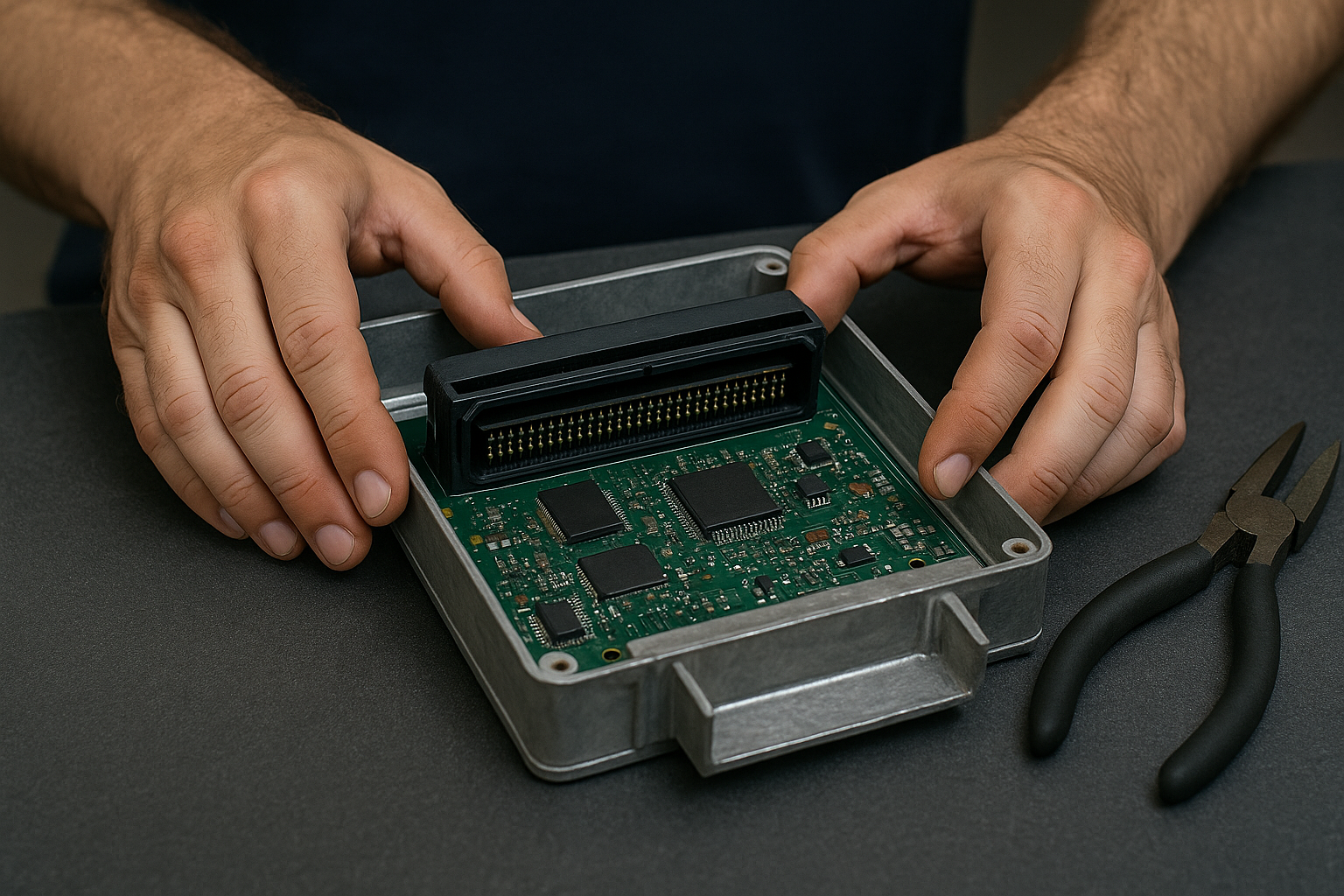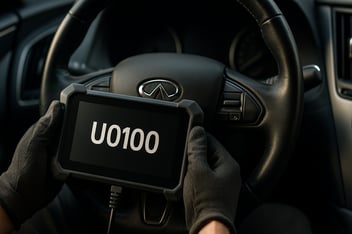Ford EEC-IV and EEC-V PCMs – Common Issues and Repair Service | UpFix
Last updated:


Here’s the problem: after decades of heat cycles, vibration, and age, these PCMs start to fail in sneaky ways. Maybe your engine cranks endlessly but never starts. Maybe your fuel pump runs even with the key off. Or maybe your diagnostic scanner just won’t talk to the PCM at all. What feels like a “simple electrical gremlin” can actually point to a failing circuit board deep inside your engine computer.
And replacing one of these modules today isn’t always simple. Many are discontinued, refurbished ones online are hit-or-miss, and dealership replacements (if you can find one) often cost over $1,000—not counting reprogramming.
That’s where UpFix comes in. We specialize in restoring Ford PCMs, giving your original EEC-IV or EEC-V unit a second life using modern, high-quality components. Our process eliminates the guesswork, saves hundreds, and keeps your factory tuning intact.
Overview of EEC-IV and EEC-V PCMs
The EEC (Electronic Engine Control) series marked Ford’s bold step into computerized engine management, beginning in the early 1980s.
-
EEC-IV (1980–1997): These PCMs were installed in a wide range of vehicles—from Mustangs and Broncos to F-Series trucks and Explorers. They used early microprocessor technology and relied heavily on capacitors that, over time, became prone to leakage and board corrosion.
-
EEC-V (1996–2004): A faster, more capable successor, the EEC-V supported OBD-II diagnostics, improved emissions control, and greater processing speed. However, they still shared key vulnerabilities with the earlier generation.
Because of overlapping production years, it’s not unusual to find EEC-IV in a 1996 model or EEC-V in a 1997 vehicle, depending on the engine and platform. Both are serviceable, but both need careful attention as they age.
Common Issues with EEC-IV and EEC-V PCMs
Over time, the EEC modules develop predictable failure modes due to aging electronics, heat exposure, and moisture. The most common symptoms include:
-
Cranks but won’t start
-
Fuel pump remains ON after key-off
-
Idle surging or unstable idle
-
No communication with scan tools
-
Loss of injector pulse
-
Incorrect reference voltage to sensors
For EEC-IV, leaking capacitors are the primary enemy. The corrosive fluid they release eats away at delicate copper traces, eventually shorting circuits and killing communication.
For EEC-V, circuit board fractures, failed IC chips, and solder joint fatigue are the usual suspects—especially in vehicles exposed to humidity or vibration.
Diagnosing PCM Problems
Before condemning your PCM, it’s important to verify the basics:
-
Check all sensors first – Oxygen, crankshaft, and MAP sensors fail more frequently than PCMs themselves.
-
Inspect wiring and grounds – Broken, corroded, or shorted wiring can mimic PCM failure symptoms.
-
Test for proper voltage and continuity – A weak ground or low voltage can disrupt PCM operation.
If you’ve done these checks and your Ford still displays the same problems—cranks with no start, stuck fuel relay, or no communication—it’s time to have your PCM tested and rebuilt by professionals.

How UpFix Repairs EEC-IV and EEC-V PCMs
At UpFix, we go beyond simple board repair. Our process fully restores your unit to factory function:
-
Place your order online at UpFix.com using your vehicle’s year, make, and model.
-
Include details like VIN, error codes, and symptoms to help our technicians zero in on the failure.
-
Carefully pack and ship your PCM to our repair center.
-
Our experts inspect, diagnose, and rebuild the module using modern high-spec components.
-
Every repaired PCM undergoes complete functionality testing and real-world simulation before return.
-
You’ll receive status updates through each step of the process.
The result is a restored, plug-and-play PCM that maintains your factory calibration and works perfectly on reinstallation—no dealership reprogramming required.
Case Study: 1995 Ford F-150 (EEC-IV)
A customer reported a no-start issue and a fuel pump that wouldn’t shut off. Upon inspection, UpFix technicians found acidic residue from leaking capacitors, which had corroded several key traces. After neutralization, board repair, and component replacement, the PCM was bench-tested and verified. The truck started instantly once reinstalled—saving the owner nearly $800 over a replacement.
FAQs
Q: How long does it take to repair my PCM?
A: Most repairs are completed and shipped back within 3–5 business days after we receive your part.
Q: Will I need to reprogram the PCM?
A: No. UpFix repairs your original module, keeping your calibration and VIN data intact.
Q: Can you fix a PCM that’s already been opened or “repaired” before?
A: Yes—we often correct failed prior repairs. Just mention that when placing your order.
Q: What’s the warranty?
A: All PCM repairs come with a lifetime warranty against workmanship or component failure
Case Study: 2002 Ford Mustang (EEC-V)
This Mustang experienced intermittent stalling and no scanner communication. Bench diagnostics revealed microfractures in solder joints connecting the processor. The UpFix team repaired the damage, resealed the board, and tested it under heat cycling. The module passed all tests and was shipped back to the customer within 4 business days.
Keep Your Ford’s Heart Beating with UpFix
The EEC-IV and EEC-V PCMs helped shape Ford’s modern performance era, powering everything from workhorse trucks to beloved muscle cars. But after 20 to 40 years of service, even the best electronics need care. When your PCM fails, it’s not the end of the road—it’s a chance to bring your vehicle back stronger than before.
By choosing UpFix, you’re not just repairing a part—you’re preserving your vehicle’s history, performance, and originality. Every repaired PCM that leaves our facility is restored with precision, tested with pride, and backed by the same passion that Ford owners bring to their cars and trucks.
So whether your old F-150 refuses to start or your SN95 Mustang keeps stalling, remember: don’t replace it—revive it.
Send your Ford PCM to UpFix today and get your vehicle running like it should—reliable, responsive, and road-ready for years to come.

 upfix.com
upfix.com 888-979-9343
888-979-9343


